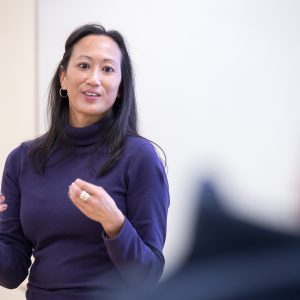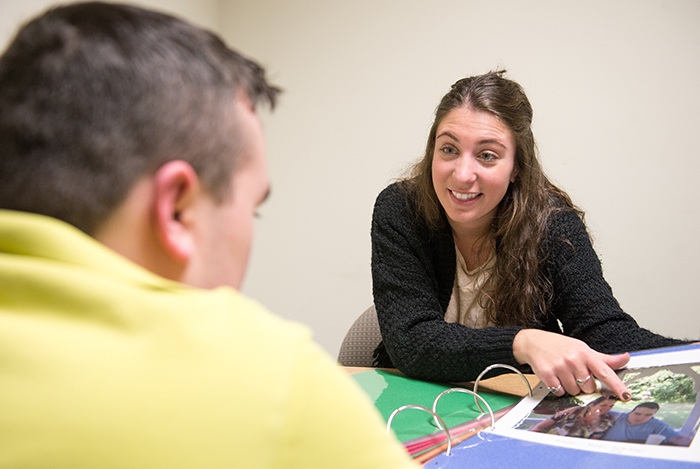
Second cohort of THRIVE Scholars announced under $1.1 million grant funded by U.S. Department of Education
The Thelma P. Lally School of Education at The College of Saint Rose has named its second cohort of 14 Project THRIVE scholars.

The College of Saint Rose is proud to have received a $1.1 million grant from the U.S. Department of Education to support Project THRIVE (Targeting Healthy Resiliency in Vested Educators), which will develop teachers and school psychologists who are highly skilled at working with school-age children with disabilities by viewing their needs through the lens of cultural diversity and mental health.
Please note all Project THRIVE slots have been filled. Stay tuned for updates on the successes of our Project THRIVE scholars.
Hear from Project THRIVE students about their experiences in the program and how the grant has helped them pursue their goals.
Project THRIVE will work with – and fund the majority of tuition for – master’s degree students in special education or school psychology and provide those students with the latest techniques and information for helping school-age children with high-intensity needs and their families.
THRIVE students could include recent bachelor’s degree graduates, certified teachers seeking to add special education certification, and change-of-career individuals.
Note: Project THRIVE encourages the enrollment of special education and school psychology scholars from underrepresented groups, including scholars who are ELLs and/or identify as having a disability. The College proactively recruits candidates from a broad spectrum of diversity, including but not limited to: geography, race, gender, religion, sexuality, and socio-economic status. The Office of Services for Students with Disabilities is designed to provide support and accommodations for all candidates with disabilities.

The Thelma P. Lally School of Education at The College of Saint Rose has named its second cohort of 14 Project THRIVE scholars.

The College of Saint Rose has received a $1.1 million federal grant for its Thelma P. Lally School of Education to develop teachers and school psychologists who are highly skilled at working with school-age children with disabilities.
Absolutely!
School psychology applicants: During the first year of the program, most of our school psychology students choose to work full-time as the course schedule allows you to take classes in the late afternoon or evening. In the second year, most school psychology students choose to work part-time in a nearby school or work as a Graduate Assistant (GA) for the College. In the third year of the program, school psychology students will be interning full-time with a school psychologist. Most school psychology students choose not to work in their third year of the program, but some are able to maintain a part-time position working at night and/or on weekends.
Special education applicants: All our special education THRIVE students have maintained full-time jobs during their first two years of the program. Many of them work as teachers or paraprofessionals in nearby schools.
No, you must attend the program full-time. Our program uses a cohort model and courses are set up to be taken at designated times.
In lecture/discussion courses requiring outside preparation, 1 hour of credit represents 50 minutes contact time each week in class and 2 hours of work outside of class. Therefore, a 3-credit lecture course requires 2.5 hours in class per week and approximately 6 hours outside of class for 15 weeks.
School psychology applicants: Click here to access the course sequence and workshops required for the three years you’ll be attending the program.
Special education applicants: Click here to access the special education website.
While Project THRIVE funds most tuition for students, many students choose to supplement their grant monies with federal funding and/or Graduate Assistantships. For more information on federal funding, please visit this website. For more information on Graduate Assistantships, please visit this website.
First, all students are required to attend a THRIVE meeting once a month. Regarding coursework and projects, students in the THRIVE program go through their respective course sequences designed by either the special education or school psychology department. During your first year in the program, you’ll take various classes together where you’ll collaborate on projects. These courses are built into your typical course sequence (i.e., these are not additional classes).
During your second year of the program, you won’t take courses together, but you’ll collaborate on shared projects that are built into courses you’re taking. For example, school psychology students taking SPY525: Consultation in Schools will collaborate with special education students taking SED567: Teaching Students with Emotional/Behavioral Problems to complete a consultation project. During your third year of the program, you’ll continue to attend remote (e.g., Zoom) monthly THRIVE meetings to check in on your success and to learn from experts in the field of education.
In addition to the advisement you’ll receive in your respective department, the THRIVE staff as well as Saint Rose faculty provide additional advisement to ensure your success in the program. THRIVE staff enjoy working closely with students to provide advice about courses, study strategies, internship/student teaching placements, and other general advice regarding their future professions.
Qualified Project THRIVE applicants include those who:
All slots for the Fall 2022 school psychology cohort are now filled. The deadline to apply for the few remaining Fall 2022 special education cohort slots is May 15, 2022.
In addition to your statement of purpose that you’ll submit with your application to your respective program, please submit a supplemental essay that addresses your interest in the Project THRIVE grant in the context of your degree and your career plans. This essay should not exceed two double-spaced pages. Please include your name on each page and your original signature at the end of the document. A saved PDF version should be emailed to grad@strose.edu and include Project THRIVE grant in the subject line.
Project THRIVE students, depending on their major, will complete a two- or three-year master’s degree program that emphasizes a culturally responsive, family-centered philosophy with recommended practices for school-age children with disabilities as core content.
Field experiences will occur in urban, suburban, and rural high-need local educational agencies (LEAs) in the economically challenged communities within the Greater Capital Region of New York. School psychology candidates have the option of doing their internships out-of-state. Team-based practice and professional networking will be frequent through remote and face-to-face opportunities.

Graduating special education scholars can earn a variety of special education teacher certifications.
School psychology students can earn a SEA credential, and will earn their master’s degree and certificate of advanced study.
Note: Many salary schedules pay more for candidates with a terminal master’s degree plus additional credit hours.
Competencies are in six areas:
The second cohort launched in Fall 2022.
Among the topics included in the program are assisting English language learners (ELLs) who have faced trauma related to immigration, acculturation, linguistic barriers, and discrimination; individuals with disabilities; and students with mental health needs.
Associate professor of special education
Project THRIVE grant coordinator,
These contents were developed under a grant from the U.S. Department of Education, #H325K190072. However, they do not necessarily represent the policy of the U.S. Department of Education, and you should not assume endorsement by the Federal Government. Project Officer, Sarah Allen.